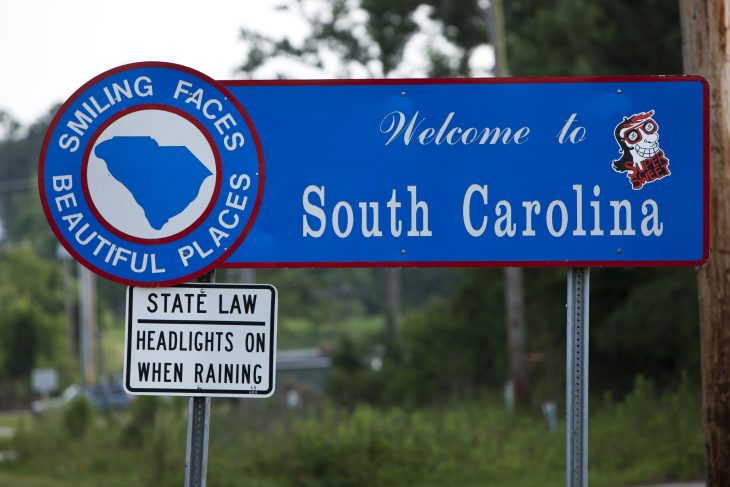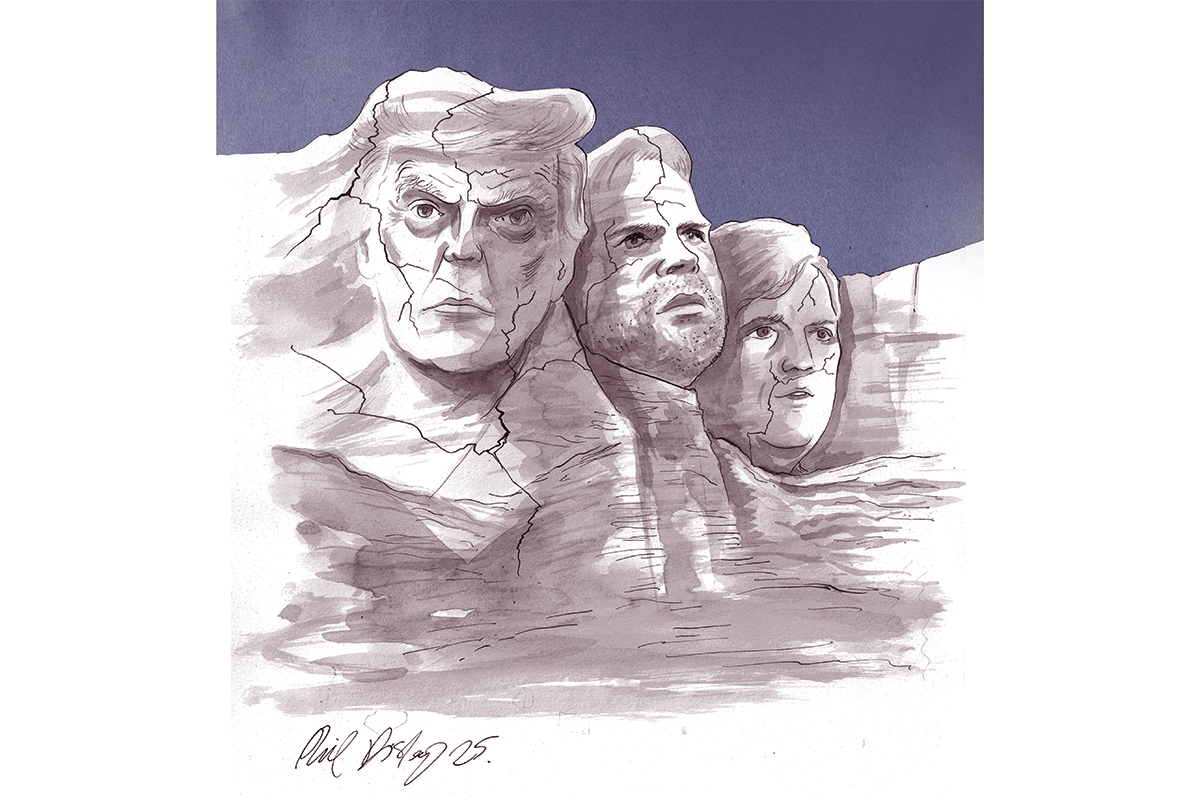The most consequential legal case for the American media in seventy years begins Tuesday. The defamation suit brought by voting technology company Dominion Voting Systems against Fox News will test how far First Amendment protections can be stretched. It will also determine whether the never-ending media circus surrounding Donald Trump pulled America’s pre-eminent conservative news brand too far into the former’s president’s carnivalesque realm to escape unscathed.
The stakes for Fox couldn’t be higher. First — though, in this uniquely fraught case, not foremost — there’s the money. Dominion is claiming $1.6 billion in damages caused by Fox News’s broadcasts related to the integrity of the company’s voting machines during the 2020 presidential election. But beyond the dollar amount of the final judgment, Fox News has its credibility as a news organization on the line.
This trial’s blockbuster potential has been dulled a little by the Delaware Superior Court Judge Eric Davis’s decision to not allow audio or video. Still, the fact that many of the nation’s most famous and provocative journalists — Tucker Carlson, Maria Bartiromo, Lou Dobbs, Laura Ingraham, Jeanine Pirro and Bret Baier, as well as Fox News’s most senior executives, including CEO Suzanne Scott — will receive high-intensity grilling under oath is box office, whether the cameras are on or not. But it’s the emperor of infotainment himself, Rupert Murdoch, whose testimony will take center stage, especially given that his deposition, punctuated by coolly stated but devastating character indictments, has already made headlines. (“I’m sure” Murdoch said when a Dominion lawyer asked if he’d called Trump “plain bonkers.”)
On Sunday night, Davis announced a delay to the start of the trial until Tuesday, sparking speculation that a settlement was on the cards. It’s not hard to see why Fox might want to pay up and avoid this embarrassing circus.
The stakes are not limited to Fox and Dominion, though. The case goes to the heart of the loftiest notions of the stability and health of America’s democratic system, as well as that of the various institutions — the media among them — that, at least in theory, are supposed to buttress it. And in the opera about a picaresque outsider who shakes a staid political system to its foundations, this may be the beginning of the final act.
Dominion v. Fox News Network will be argued in a Delaware court but adjudicated according to New York law. This last fact is significant, as New York State law does not generally make allowances for a doctrine known a “neutral reportage,” which states that news organizations serve as a kind of legal pass-through for claims and statements made by others. Even still, Judge Eric Davis seemed to have taken that defense off the table, writing in a ruling that “[Fox News Network’s] failure to reveal extensive contradicting evidence from the public sphere and Dominion itself indicates its reporting was not disinterested.”
What this leaves on the table are practical considerations related to actual malice — did Fox News knowingly or recklessly make false claims? — and the extent of the damages (Fox is arguing that Dominion’s claim of $1.6 billion is out of proportion to the company’s value). But in a case like this one, there is no avoiding the First Amendment. And once the excitement of the big names taking the stand subsides, that might be what this case really ends up being about.
If Dominion wins, it could lead to a major restriction in how American news outlets understand their First Amendment protections. Are news organizations on the hook for every false claim published or broadcast by their journalists, so long as people in the network believed them to be untrue? What becomes the standard for knowing, rather than simply believing or suspecting, a claim to be false? In the case of Dominion, it is exceedingly unlikely that in the days or weeks after the election Fox News hosts or executives had proof that the complex algorithms that govern the voting machines were reliable. They simply believed Sidney Powell’s claims were false. Even though those beliefs turned out to be correct, it’s a philosophical truism that incidentally correct beliefs arrived at by incorrect methods do not constitute knowledge.
Dominion v. Fox News Network is centered on the heady moments that followed the 2020 election when, seemingly out of nowhere, an attorney named Sidney Powell emerged with extraordinary claims of voting fraud on behalf of a defeated Trump. In the context of the us-versus-them atmosphere that had gripped the country since the 2016 election, and which had been brought to a fever pitch by Covid and the BLM riots, the claims of a well-oiled establishment conspiracy to unseat a populist president chimed with a broader pattern of “deep state” interference in American public life. The left-wing-dominated mainstream media had woven elaborate tales about Trump as a Muscovian Candidate. His supporters now had proof of a conspiracy that turned Russiagate on its head.
The truth, of course, is a little more complicated. For months before the election, Trump and his campaign had sowed the seeds of voter fraud with ominous claims about the danger of mail-in ballots — and used Fox to get the message out. “These ballots are going to be all over. It’s a fraud and it’s a shame,” Trump said in his September 2020 debate with Biden, over a month before the actual election. “This is going to be a fraud like you’ve never seen.”
As early as August, Trump had begun tying mail-in ballots to potential fraud, including in an interview with Fox Business host Maria Bartiromo, in which he seemed to imply that he was holding up US Postal Service funding in order to slow the delivery of mail-in ballots. By October, Trump was still messaging the issue, again with Bartiromo in a lengthy interview. “It’s a corrupt system because they’re sending out millions of ballot,” Trump told her. “When you send out millions of ballots and you’re the sender, you can send them wherever you want.” Trump’s scaremongering about mail-in ballots would end up introducing ambiguity into the voting results since it likely caused delays in authorities’ ability to call counties on election night, as the director of Fox News’s Decision Desk Arnon Mishkin explained.
Nevertheless, on November 7, Fox News called the election for Biden. The very next day, Fox News helped introduce America to Powell, who would become a hotly covered media fixture over the following months. On October 8, Bartiromo invited Powell onto her show Sunday Morning Futures to discuss claims of election fraud. It was there that Powell would claim that the fraud was not just widespread and deliberate, but decisive. The millions of votes that Powell alleged had been illicitly switched by Dominion machines from Trump to Biden would, by her telling, have swung the election in Trump’s favor. “There has been a massive and coordinated effort to steal this election from we the people of the United States of America, to delegitimize and destroy votes for Donald Trump, to manufacture votes for Joe Biden,” Powell told Bartiromo. “When the votes are really audited and the real votes are counted, Trump will win. He is the president and he is in charge of this country.”
Powell listed a number of alleged methods by which the fraud was perpetrated. Among them was a mention of devious algorithms and “computer systems used to flip those votes.” But it was Bartiromo who would bring Dominion directly into the conversation. Before going to a commercial break, the Fox News host said, “Sidney, I want to ask you about these algorithms and the Dominion software. I understand that Nancy Pelosi has an interest in this company.” After the break, Bartiromo continued the conversation about Dominion, saying, “I know that there were voting irregularities.” Powell, who went onto detail the supposed conspiracy Dominion was party to, did not substantiate claims that Nancy Pelosi or Richard Blum, the late husband of Senator Diane Feinstein, had “interests” in the company. (In fact, she mostly ignored them.)
The Bartiromo interview would become something of a template for how many of the Fox News hosts named by the Dominion suit — Carlson, Hannity, Dobbs, Pirro and Bartiromo — would approach the question of claims concerning the company. In almost every case, the Fox hosts put questions about allegations of Dominion-linked fraud to Powell and Rudy Giuliani, who, as Trump’s lawyer, also took up the crusade to prove voting fraud.
In a November 30, 2020 interview with Powell, Sean Hannity cited various mainstream news outlets as evidence that Dominion systems “suck” before asking Powell about her claims that there were “people watching an internet connection in real time but they can’t speak publicly.” This lead-in allowed Powell to serve up another helping of unsubstantiated claims, this time about scared Dominion whistleblowers.
Hannity followed the pattern: ask questions, nod thoughtfully at Powell or Giuliani’s responses, and express outrage at what was being alleged. Among all the hosts named in the case, it was Dobbs who would break the template with statements that came close to actual allegations against Dominion, as when, on December 10, 2020, he asked Powell how the company engaged in a “coordinated effort to actually bring down this president.” (Dobbs’s show was canceled in February 2021, shortly after Dominion filed its suit.)
On the face of it, the hosts were, for the most part, asking questions about a subject in the news. That is, indeed, part of the defense Fox News is relying on in the case — this was just a matter of journalists being journalists. Whether or not you like the journalism is a separate matter; there is more than enough slanted, insinuating and salacious journalism in the American media to go around. Almost none of it becomes the subject of defamation suits with more than a snowball’s chance in hell. Case in point: Sarah Palin’s lawsuit against the New York Times, which had falsely accused her of inciting mass murder, was tossed by a judge.
To Fox’s credit, many of the network’s leading hosts cried foul about Powell’s claims. While much has been made of text messages revealed by the case in which Fox hosts blast not only Powell but Trump himself — Tucker Carlson is, characteristically, the most colorful, labeling Trump a “destroyer” and a “demonic force” — the reality is that many of network’s top talent did the same on air (albeit in more sober tones).
In a scathing November 19 segment, Carlson took Powell’s Dominion-related claims to task, calling on the former prosecutor to release evidence to back her claims. “[Powell] never showed us that a single vote was switched from one candidate to another. Not one. So why are we telling you this? Because it’s true. And in the end, that’s all that matters.” On November 6, Brett Baier said of the claims, “We are not seeing any evidence of widespread fraud.” Brit Hume tweeted a November 17 Wall Street Journal article highly critical of Trump’s election claims, writing, “Good question… President Trump blames the election result on Dominion’s systems. Where’s the evidence?”
With this in mind, critics of Fox News on the left have used these claims to attempt to prove (in the court of public opinion, that is) that Fox News as an institution was knowingly lying. The network knew the truth but continued to promulgate the lie, this line goes. The motivation behind this argument is clear: in the US, proving defamation is an exceedingly high bar that involves demonstrating the defendant harbored “actual malice” — or false and reckless disregard for the truth.
Behind the scenes, Fox News’s most senior decision makers, including Rupert Murdoch, were similarly debating how the network should approach claims of voter fraud. In early January 2021, Murdoch and Fox News CEO Suzanne Scott debated having top hosts, including Hannity, Carlson and Ingraham, put out a statement saying, “The election is over and Biden won.” But Scott responded to Murdoch, saying, the hosts “are all [on the same page about this] but we need to be careful about using the shows and pissing off the viewers.” Paul Ryan, the former speaker of the House who serves on the board of Fox News’s parent company, pushed for the network to leverage the election shenanigans as a pivot away from Trump: “[W]e are entering a truly bizarre phase of this where [Trump] has actually convinced himself of this farce and will do more bizarre things to delegitimize the election. I see this as a key inflection point for Fox, where the right thing and the smart business thing to do line up nicely.”
That notion — of a pivot away from Trump — was top of mind for Fox brass. “I do think Fox News needs a course correction,” Preston Padden, then a top executive at the network, texted Murdoch two days after January 6. Murdoch’s response was unequivocal: “Fox News very busy pivoting. We want to make Trump a nonperson.” Behind the scenes, Tucker Carlson was even more brutal when it came to Sidney Powell’s claims of what amounts to a coup d’état: “Sidney Powell is lying by the way. I caught her. It’s insane,” Carlson texted Ingraham.
But this legal sword might cut both ways. While it shows that senior leaders at Fox believed the claims to be false, it also points to a wall between the company’s business and editorial leadership. In the anti-Fox imagination, Fox is a Murdoch mouthpiece. In actuality, what we see is far from Murdoch handing down the editorial order of the day: the Fox boss works, sometimes gingerly, to persuade and foster consensus, seemingly careful not to overstep his bounds.
This leads to another key question. Whether Dominion can show that Fox News acted as one — an entire news company of thousands of employees and dozens of hosts — will be a harder hurdle to clear. It might be this notion that guided Rupert Murdoch’s strategy when, under deposition, he openly disavowed the claims made on air by some Fox hosts. That could leave some room for Fox to argue that executives should have reined in some hosts, a scenario which implies that journalistic standards were not properly enforced by executives. Incompetence, while unflattering, is a charge that falls far short of meeting the standard of actual malice.
What is clear is Powell’s claims were not just given a national platform by Fox (they were given that too by Trump). Rather, the network’s decision to have Powell and Giuliani on the show repeatedly, for months on end, to air their conspiracy theories challenges the network’s claim that this was just a matter of giving some airtime to a prominent, if wacky, idea. Cable news is notorious for moving on the moment a story starts to grow stale. The question Fox will have to answer is whether by keeping Dominion claims on the air week after week the network deliberately sought to keep the story fresh.
There is similarly no doubt that those claims ranged from totally unsubstantiated to willful falsehood. Fox’s brand will likely suffer. By handling very serious, evidence-light allegations with kid gloves, neither substantiating them, nor, in many cases, challenging them, Fox failed its viewers. Worst of all, false claims of a stolen election inflamed a nation already suffering from the infection of internal discord.
Whichever way the verdict falls, the trial will have a significant impact (that’s if, of course, last-ditch attempts to settle out of court fail). There are vanishingly few libel cases that have been successfully brought against news organizations in the US. That the New York Times was able to falsely accuse Sarah Palin of inciting mass murder and not even have the trial come to completion is proof of that. But with Dominion v. Fox News we might be seeing a turning point as the American legal system becomes further enmeshed in a great power struggle clothed in “debate” about disinformation. The standard for what can be said, and what can’t; the allegations that are permissible, and those that aren’t; are increasingly taking on a political character.





















